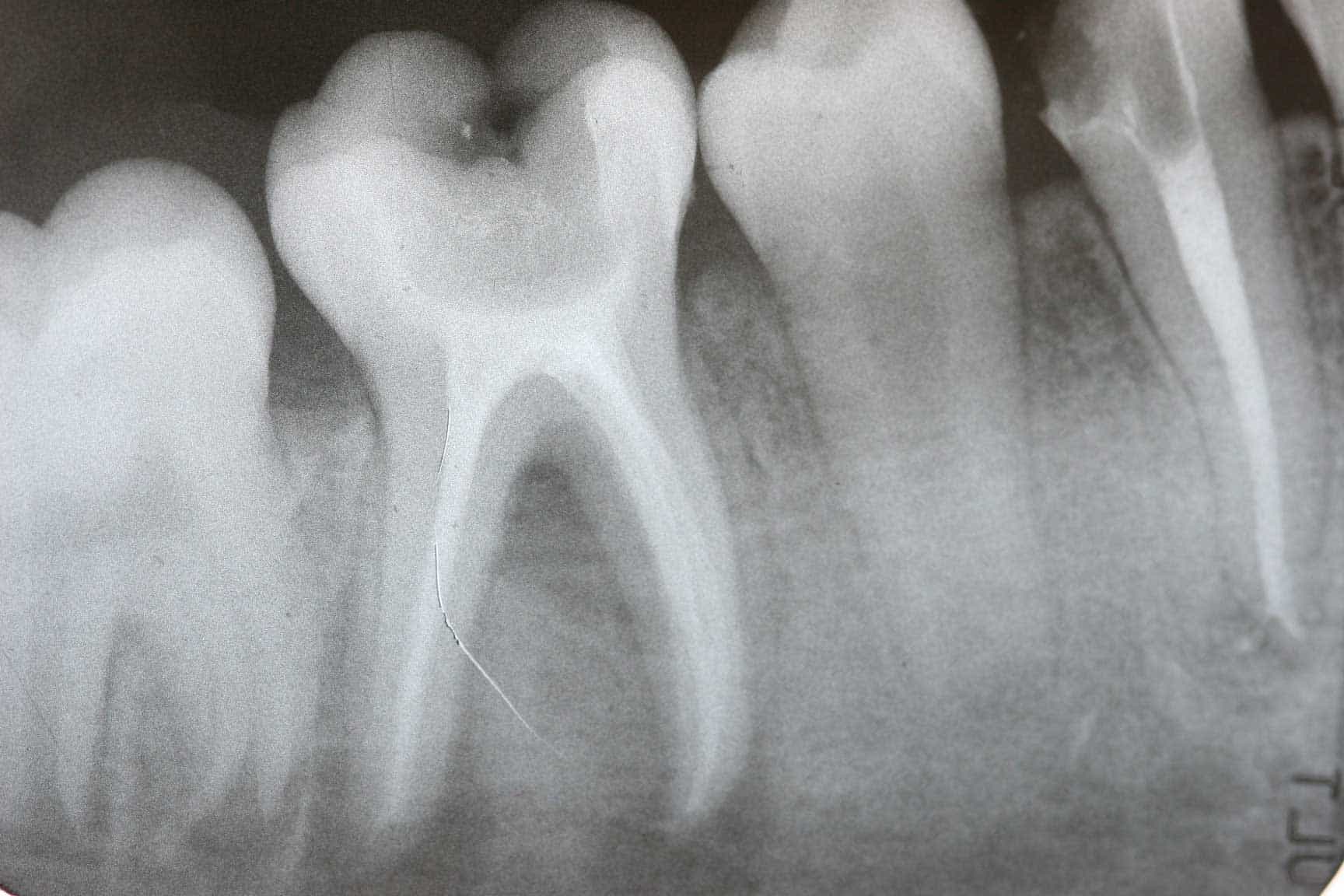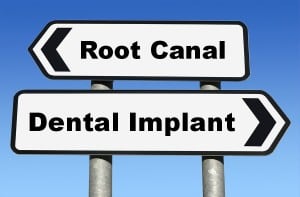
Are root canals or implants more expensive?
Which is more expensive a root canal or dental implant? In general implants cost more than root canals. Implants can last a lifetime, but root canals last 5-10 years on the average. Root canals cost approximately $3000 and implants cost $5000 on the average. Many people will skip a root canal and choose to have a tooth replaced with an implant instead. This is because an implant can be a better financial investment and they do not fail as often and cause jaw abscesses.

cavitation
Are root canals or implants a better investment?
The answer may not be known till later. It all depends on how long your root canal lasts. Sometimes root canals work and sometimes they do not. If the root canal fails, you will need to remove the root canal tooth and replace it with an implant. The catch is, root canals fail months or years down the road. Meaning you may be spending money on both a root canal and an implant.
How long do root canals and implants last?
Root canals last 5-10 years on the average. Implants can last a lifetime and usually are a much better long term investment than root canals. Some people are opting to get implants instead of root canals because $3000 + $5000 = $8000. Any why spend $3000 for a root canal when in a short period of time you will need to pay $5000 for an implant. It may be better to go right to the implant.
Can an Implant be done Instead of a Root Canal?
What happens if you do not do a root canal? Implants usually last much longer than root canals. In fact, many dentists believe implants can last a lifetime. Implant procedures are more predictable than root canals. Technically implants replace teeth that are missing (and are not an exact alternative), but one can choose to electively do an implant procedure instead of a root canal.

Root Canal Vs Dental Implant
Is a Root Canal More Expensive than an Implant Video:
Related Articles:
Implants last longer than implants
Root canal teeth can still get cavities, but implants will never rot or get decay. Root canal teeth are also more likely to crack and break than implants. They are dead teeth. Just like a dead trees branches get more and more brittle every year. And of course, root canals can cause abscesses when bacteria leaks from the tooth into the underlying bone. Implants do not have bacteria inside them and do not cause bone abscesses. Such is the debate to get root canal or to pass go and get an implant instead?
Should you remove tooth and do implant instead or root canal?
One thing is for sure – if you end up paying for a root canal and an implant, you will not save any money. The question about which is more more expensive will be moot.
The stale debate has favored root canals for years. Now implants are routine, done by more dentists. Health concerns with root canals have been questioned by some professionals. Many people are opting to skip root canal procedures and go right to the dental implant. Some biological dentists believe failing root canals can cause health problems by leaking concentrated bacteria and toxins into blood supply under the teeth. The question is whether or not pathogens and toxins in root canals can leak to other parts of the body and cause serious disease such as cancer, Hashimotos, Lupus and cardiovascular disease. Since disease is complex it is very difficult to establish a direct link between root canals and systemic disease. Sometimes root canals can hurt the health of the bone and increase the chances of having implant problems and complications.
What is the life expectancy of a root canal?
The average life expectancy of a root canal tooth is often 5 to 10 years. The cost of a root canal in Burtonsville Maryland is $3500 including a necessary crown. The cost of a dental implant is closer to $4500. Most individuals who lose a tooth will want to replace it with an implant. In the long run doing a root canal will cost you more money since you will incur the cost of the root canal and the implant (that is if you enjoy having a tooth in your mouth). That is you will pay $3500 for the Root Canal and Crown and later $4500 for the dental implant in todays dollars. That is if you are lucky, because normally a root canal will damage your bone and you will need a bone graft to get an implant. Depending on the damage to your bone (because root canals fail by leaking bacteria into your jawbone) the bone graft can cost between $500 – $2500 extra dollars. It also takes longer to get a new tooth. And there are more surgical procedures and appointments in the dental chair.
How to Properly Remove Root Canal Teeth Video:
Should a Root Canal Retreat or 2nd Root Canal be Done?
The success rate of getting a 2nd root canal is 50% or less. Root Canal Retreats are more expensive than the first root canal. Most root canal redos cost from $1300 – $2500 depending on whether it is a molar or a front tooth. And who is doing the procedure. I would never throw good money at bad money like that and retreats normally last a shorter period of time than a first root canal.
Should I get a Root Apicoectomy or Implant?
The concept of an apicoectomy is to cut the bottom of the root off and apply a filling to better seal to the bottom of the root, so bacteria stops leaking out. The idea is to better prevent bacteria from leaking out of the bottom of your tooth. A tooth is porous, so bacteria in the tooth is probably leaking everywhere. The Root bottom may be the biggest hole, but…This procedure will likely not last too long if really work at all. Probably throwing good money at bad money.
Why a Root Canals are Better Than Implants?
A Root canal will cost between $800 and $2000 depending on what tooth it is and who does the root canal. A root canal will typically take 45 minutes to 2 hours in the dental chair over 1-2 visits. At a later visit (best done within 2 weeks of the root canal) you will need a filling in the top part of the tooth called a “build up” and a crown. If the crown and filling are not done in a timely fashion, the tooth will crack and break and the tooth will be lost. On the average root canals will last 5 – 10 years depending on what standard for “working” is being applied. I find that many root canals when evaluated with a high quality 3D Xray show signs of bone loss. Most X rays are 2D and are not able to detect bone loss around root canals as well. A 3D xray called a cone beam CBCT is necessary to fully evaluate a root canal tooth.
What is the Sales Pitch for Implants over Root Canals?
A dental Implant costs $1000 – $2500 depending on what kind of implant it is and who is placing it and where it is being placed. Worth mentioning, not all implants are of the same quality and different implants are made of different materials. Now we have Zirconia which is a tooth colored, non-metallic material and Titanium. Zirconia is more biocompatible than titanium and it is a better cosmetic option in the smile zone. What dental implant material is best? Do non metal implants cost more than titanium implants?
How do I know if a Root Canal is failing?

Root Canals do not Always Work
- Bacteria can leak out of the root canal and enter and infect the bone
- Root canal filling materials are most often “gutta percha” which is mostly Latex. 20% of the population is allergic to latex and it may be more. Some people may not be allergic but sensitive. Tooth roots are porous and whatever is in it slowly leaks out of the tooth no matter what. What this means, is latex particles and bacteria are constantly leaking out of the tooth. So the real question may be, “did the root canal really every work?”
- Root canal teeth are dead and can be subject to rejection by the immune system. Your body isn’t stupid- who or what would want to hang around something that is dead and full of bacteria and irritating material.
How does my Dentist know if my Root Canal has Failed?
Normally the dentist will take a 2D x-ray to look for bone loss. He/She will additionally look for visible signs of swelling and infection around the tooth. The problem with this approach is it takes a long time for bacterial infection to cause enough bone loss to be detectable in a 2D x-ray. In fact it takes a while to cause much bone loss at all. In healthy individuals, the persons immune system will kill the bacteria as it leaks out of the tooth and bone may never be loss. You immune system is just stuck fighting the constant leak of bacteria from the root canals. And what about the latex an the dead tooth issue. Look, the situation is less than perfect.
But remember, there was a time where we did not have Implants and good tooth replacement options. What would you do if you had to choose between losing your front tooth or doing a root canal? Some teeth lend themselves to easier cleaning and sealing than others. For example, a front tooth has one root and these are easier to clean and fill.
There is no wrong path of treatment regarding root canals and Implants if you understand the procedures.
Just go in with your eyes open and consider all the good and bad – finances, time in the dental chair, your health, and the result and you cannot make the wrong decision.
One dilemma in the dental profession is a dental implant is not an alternative to a Root Canal. A Root Canal “saves a tooth” whereas a dental implant is a tooth replacement option usually given after a tooth is lost or if the tooth cannot be fixed.
Are implants safe and do they always work?
Any dental procedure is not without risk of complication. After any procedure in the mouth there can be an infection for example. In most cases the risk of infection in a health patient is minimal. Then the question is how long will the procedure work?
Dental implant work 95% of the time and if they fail it is usually within the healing period of the first few weeks after getting the implant. Once a dental implant has healed, todays dental implants usually last a lifetime. Dental Implants are sterile and they do not decay and they never leak bacteria into the gum and bone. This last fact is a major advantage of implants over root canals.
Why do dental implants fail?
The three most common causes are:
- Placement of implants into unhealthy patients
- Placement of implants into unhealthy bone. The most common unhealthy bone is 1) bone where there used to be a root canal. Root canals hurt the efforts of future tooth replacement. 2) bone where no tooth has been present for a long period of time.
- Patients who do not follow the care instructions after implant placement. For example a patient should never chew on top of a new implant site and they need to take medications as prescribed. Care instructions need to be followed. Believe it or not, some people spend lot of money and time in the dental chair and sabotage their own case.

 (301) 421 1996
(301) 421 1996 burtonsvillesmiles@gmail.com
burtonsvillesmiles@gmail.com